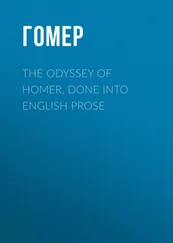Alexander Poleshchuk - The Secret of Homer
Здесь есть возможность читать онлайн «Alexander Poleshchuk - The Secret of Homer» весь текст электронной книги совершенно бесплатно (целиком полную версию без сокращений). В некоторых случаях можно слушать аудио, скачать через торрент в формате fb2 и присутствует краткое содержание. Город: Moscow, Год выпуска: 1968, Издательство: MIR Publishers, Жанр: Фантастика и фэнтези, на английском языке. Описание произведения, (предисловие) а так же отзывы посетителей доступны на портале библиотеки ЛибКат.
- Название:The Secret of Homer
- Автор:
- Издательство:MIR Publishers
- Жанр:
- Год:1968
- Город:Moscow
- ISBN:нет данных
- Рейтинг книги:4 / 5. Голосов: 1
-
Избранное:Добавить в избранное
- Отзывы:
-
Ваша оценка:
- 80
- 1
- 2
- 3
- 4
- 5
The Secret of Homer: краткое содержание, описание и аннотация
Предлагаем к чтению аннотацию, описание, краткое содержание или предисловие (зависит от того, что написал сам автор книги «The Secret of Homer»). Если вы не нашли необходимую информацию о книге — напишите в комментариях, мы постараемся отыскать её.
The Secret of Homer — читать онлайн бесплатно полную книгу (весь текст) целиком
Ниже представлен текст книги, разбитый по страницам. Система сохранения места последней прочитанной страницы, позволяет с удобством читать онлайн бесплатно книгу «The Secret of Homer», без необходимости каждый раз заново искать на чём Вы остановились. Поставьте закладку, и сможете в любой момент перейти на страницу, на которой закончили чтение.
Интервал:
Закладка:
'…there's a wondrous contrivance
Hid in that well-wrought bed, which myself and no other invented.
Once, in the courtyard, there grew a leafy and wide-spreading olive,
Flourishing and full-grown, and like to a pillar in thickness.
Round it I built a wall with great stones fitted together,
Making a chamber, and then, on top, I roofed it securely.
And I make folding doors of solid construction to guard it.
Then I cut off the boughs of the leafy and wide-spreading olive;
Then I cut off the trunk and smoothed the stump with the hatchet.
As a good craftsman should, and shaped it true with the T-square
So as to form a post and bored in it holes with an auger.' "
"And was it that very bed that Schliemann discovered?" exclaimed Artem.
"Schliemann found the remains of a huge olive-tree surrounded by stone walls, but that may well have been a coincidence. What conclusions can be drawn from this passage?"
"Plenty. This bed was a secret known only to Odysseus' family, and only he or his son could have been acquainted with it. Even Eurycleia the nurse didn't know the bed could not be moved. And if Odysseus really did exist, then why deny the possibility of Homer's existence? All that must be checked."
Those were the words he used: "That must be checked." There was something unusual in Artem's words. I recalled the exclamation made by one of the boys 'smashing'. But I only said:
"My job is not to 'win you over' to the side of the humanities.
"All I wanted to do was to interest you a little in the art of the ancients and their history. After all, acquaintance with art ennobles man."
"And doesn't working together on the solution of man's urgent problems ennoble us?" asked Artem, rising to his feet.
He went quickly out of the classroom and somebody remarked, "Artem's gone straight to the lab."
I did not see him again until one very memorable day when he came up to me himself and said, a little embarrassed: "I've got everything ready; we can set out in search of him now, if you like."
"In search of whom?"
"Of whom? Of Homer."
I burst out laughing.
"But Homer must be 'sought' in ancient manuscripts. One has to analyse and compare texts, and plunge into an infinitude of commentaries."
"Or plunge into the infinitude of time," remarked Artem. "The machine is ready. I 'thought you'd agree."
I was so bewildered I let Artem take me to the laboratory. Some sort of apparatus stood by the window, its polished metal gleaming, and, on the whole, resembling a twentieth-century battery truck.
I got on to the metal seat and Artem sat down beside me. I swear now, hand on heart, that I had not taken any of it seriously. I was sure that Artem had simply decided to play a trick on me and would laughingly confess to his joke. But nothing of the sort happened. He bent over the control panel and suddenly the walls of the laboratory began to disappear slowly before our eyes. Vague outlines of human figures appeared, demolishing the walls of the laboratory with strange movements. The sun blazed for an instant, and as suddenly vanished.
It was some time before I came to myself. Our "truck" was running down a stony road. We were surrounded by green groves, and the sun was high in the sky. Artem stopped the truck at a bend in the road, from which the sea could be seen. "Where are we?" I asked. "We'll soon know," answered Artem. He leaped lightly from the "truck" and began quickly to climb a knoll. At the top sat a man in a yellow garment, of unusual cut. When he got up and bowed to Artem, I saw that its sleeves had been cut short. "Why, it's a chiton!" I thought. Beyond the knoll lay steep slopes, and in the distance towered great rocky mountains. A voice seemed to whisper in my ears, "Olympus. This is Olympus."
Artem came running down the hill, and jumped into his seat on the truck.
"Well, what did you find out?" "Everything's fine. The goatherd said that Homer is dead, but his grandfather remembered the poet very well."
"What century is it now?" I asked, still not believing that all this was not a dream.
"Now?" Artem bent over the instruments and turned a knob above something that looked like a speedometer. "We're in the twelfth century- B.C., I mean."
There were several more "stops" and finally we came to a halt in the middle of a broad meadow. Evening was falling and singing could be heard coming from a hamlet whose low cottages showed through the trees. There was no one to be seen. Artem asked me to get up for a moment, took a packet from under the seat, and opening it, offered me a cheese sandwich. "Where arc we now?"
"I'm afraid we may have gone too far this time." Artem took a huge bite from his sandwich with great relish and then suddenly nudged me, pointing towards the hamlet. A horseman was galloping at full speed through the dewy grass toward us. He was approaching us rapidly and the clank of his armour drowned the barking of the dogs and the song and the incessant singing of the cicadas. The horseman galloped up to us and pulled up in astonishment, raising his heavy spear in his right hand. I drew my head into my shoulders, expecting the blow to fall any moment, but Artem, without getting up from his seat, raised his hand, still holding the lunch packet, and greeted the horseman loudly in Aeolian. "Rejoice!" said Artem. "Rejoice!" "Thou, too, rejoice, youthful warrior, and thou honourable sir," replied the horseman, jumping off his horse.
"We are seeking Homer," said Artem. "Have you not seen him?"
"Homer?" repeated the warrior. "Homer… I have not heard of this basileus. Or perhaps he is a simple swineherd who has fled from your house?"
"No, he makes verses."
"Makes verses? Then it must be the poor singer! He was with us yesterday and sang for a long time in the square, but may the curses of the Gods fall on my head if any one of us gave him so much as an old bone. He is better off in other places where there are still stupid dogs who have forgotten what Troy cost us. This beggar took the road to the sea." Artem turned a key and our "truck" began to move gently over the grass. The horse gave a start, and shied, and galloped off towards the hamlet, and for a long time we heard the voice of the horseman calling his steed.
In the morning we saw the sea. The air was clear; a quivering line of jagged rocks marked the contours of a distant island. Artem got out of the "truck" and helped me get down. The sun was rising in a blue cloudless sky, promising a hot day.
"Someone's sitting over there," said Artem, nodding toward a rocky precipice. True enough, about a hundred yards from us, a man was sitting on a rock. At that distance he merged into the grey rocks, but as we came nearer I saw an old man, sitting motionless, his gaze fixed on the narrow strip of the distant island. We approached nearer.
"It's Homer!" exclaimed Artem. "It's Homer! And that's as true as that island there is Ithaca." The old man did not turn his head at the sound of our footsteps and seemed to be asleep; but when Artem addressed him, he immediately returned his greeting. Yes, the legend was true: Homer was blind.
"He can't see," said Artem. "He's blind." I examined the old man's face, expecting to see the sightless eyes of the poet, known to us all from the classical bust, but suddenly realized something more. He was not just blind. The wrinkled lids had sunk into the sockets. Homer had been blinded.
"Homer," I said. "Men of the future are speaking to you. Do you understand? We are separated by thirty-three centuries."
"Are you Gods?" asked the old man sonorously and simply.
"Oh, no! Not at all! We are mortals but have come here from the distant future. You are remembered and honoured, Homer, as a great poet. Your songs have been taken down in writing- both the 'Iliad' and the 'Odyssey'."
Читать дальшеИнтервал:
Закладка:
Похожие книги на «The Secret of Homer»
Представляем Вашему вниманию похожие книги на «The Secret of Homer» списком для выбора. Мы отобрали схожую по названию и смыслу литературу в надежде предоставить читателям больше вариантов отыскать новые, интересные, ещё непрочитанные произведения.
Обсуждение, отзывы о книге «The Secret of Homer» и просто собственные мнения читателей. Оставьте ваши комментарии, напишите, что Вы думаете о произведении, его смысле или главных героях. Укажите что конкретно понравилось, а что нет, и почему Вы так считаете.












